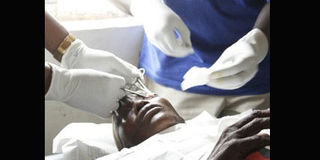Bid to prevent trachoma in Isiolo County

A woman undergoes an operation to treat trachoma, an eye disease caused when the eye is infected with Chlamydia trachomatis. A five-year strategy was Wednesday launched to eliminate trachoma, a leading cause of blindness globally. FILE PHOTO
What you need to know:
- It is estimated that about 53,000 people in Kenya have been blinded by trachoma and an additional 70,000 are at risk of immediate blindness in the next one decade.
- In Isiolo, the average prevalent rate for trachoma in children below nine years is 11.4 per cent and 0.6 per cent in adults.
More than 88,000 residents in Isiolo County will receive free medication for prevention of trachoma.
The move comes amid reports which indicate that at least 500 people in the county require immediate eye surgery to avert blindness.
Majority of these are children aged between 1-9 years who have high exposure to dust, poor hygiene and sanitation, common mediums for spread of the disease.
Isiolo County Health Director Stephen Kiluva on Wednesday said there is need to prevent the disease at early stages.
According to Dr Kiluva, the campaign targets all residents who have been declared vulnerable due to the semi-arid climatic conditions.
“We are starting a mass drug administration to all residents of Isiolo. All the people will be given acytromiacin for adults and tetracycline for children,” he said.
EARLY CONTROL
It is estimated that about 53,000 people in Kenya have been blinded by trachoma and an additional 70,000 are at risk of immediate blindness in the next one decade.
In Isiolo, the average prevalent rate for trachoma in children below nine years is 11.4 per cent and 0.6 per cent in adults.
Dr Kiluva said the campaign is a great opportunity for residents to take early treatment making it easier to control the disease in early stages through administration of antibiotics s well as facial and body hygiene.
According to Ernest Wanyama from the Ophthalmic Services Division at Health ministry, trachoma spreads fast where there is scarcity of water, poor environmental and personal hygiene.




